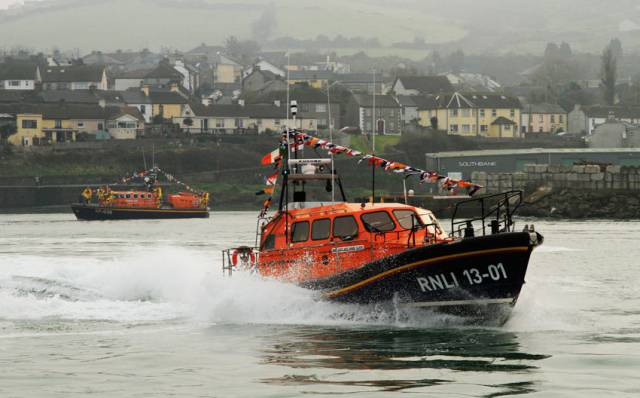Wicklow RNLI’s relief Shannon class lifeboat Jock and Annie Slater has its first callout yesterday morning (Tuesday 9 April) to go to the aid of a whelk-fishing vessel with engine failure.
The lifeboat, under the command of second coxswain Ciaran Doyle, located the drifting vessel two miles east of Kilcoole at 11.10am.
Weather conditions in the area at the time had an easterly Force 5 with moderate sea.
A towline was quickly established, and the trawler was taken in tow. The fishing vessel and three crew were brought safely alongside the South Quay in Wicklow Harbour shortly after 12.30pm.
This was the first callout for the Shannon class lifeboat which went on station last Friday.
It comes during a very busy period at Wicklow RNLI as Jock and Annie Slater replaced Annie Blaker, the last Tyne class lifeboat in the RNLI fleet, which was officially retired last Friday 4 April after 30 years of service with Wicklow lifeboat station.
The slipway-launched lifeboat has been the busiest all-weather lifeboat in the history of the station — being involved in over 340 services, and rescuing over 400 people, since her arrival in 1989.
The final callout for Annie Blaker came last Thursday evening (3 April) when coxswain Nick Keogh and a volunteer crew launched to assist two sailors on a yacht with a rope-fouled propeller nine miles off the Wicklow coast.
Annie Blaker has been replaced by the relief lifeboat Jock and Annie Slater, which will operate from temporary facilities at the South Quay while the slipway and station are redeveloped to accommodate a new permanent lifeboat, which is expected to arrive in 2022.
Wicklow RNLI operations manager Des Davit said: “This month will be bittersweet for all of us involved in Wicklow Lifeboat Station. We will be saying goodbye to a magnificent boat, the last Tyne in the fleet, the Annie Blaker.
“At the same time, thanks to a magnificent effort of skill, determination and commitment by the crew just one month after her arrival, Lifeboat 13-01, the Jock and Annie Slater, went on service.
“Because of the skill of the crew and their huge commitment to training this new, state of the art lifeboat went on service much earlier than anticipated.
“We hope to have a farewell party for ‘Annie’ later in the month so keep an eye out for more information on this both in the press and on social media.”
In other news, BT Ireland, operator of the national 999/112 emergency call answering service, has donated €5,000 to the RNLI.
Bundoran, Rosslare and Courtmacsherry RNLI each received donations through BT Ireland’s nationwide payroll giving scheme ‘Give As You Earn’ to support their vital services in the community.
Captain Tony McGowan, Bundoran RNLI lifeboat operations manager, said: “This is a huge donation that will help our lifeboat crews continue to save lives at sea.
“These funds will help to ensure our crews are fully kitted, trained and skilled to do the work that they do and that our lifeboat is equipped, fuelled and maintained.”
































































